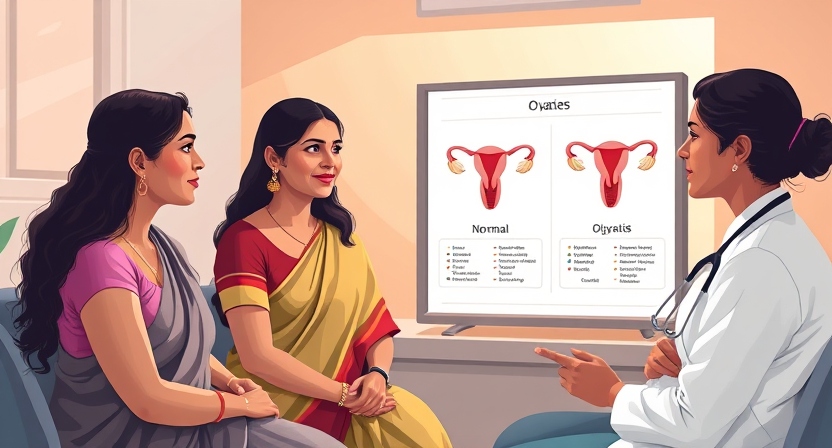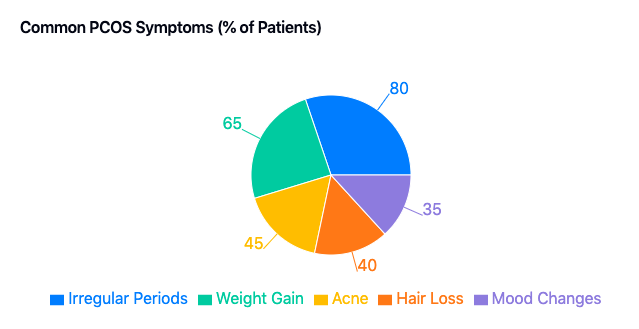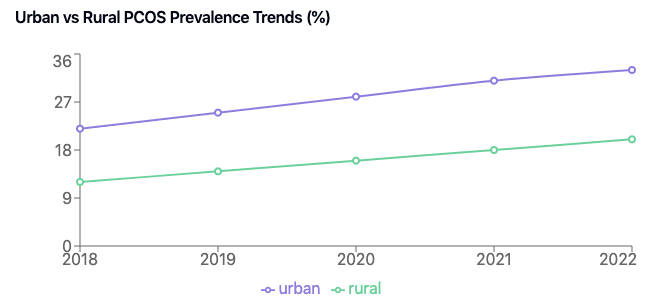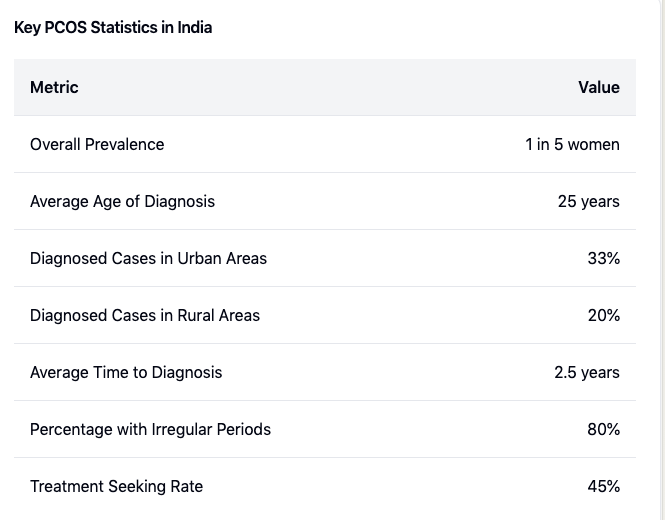Introduction

Just picture this, waking up each day with uncertainty about your very own body. This is a reality for many Indian women owing to disorders such as Polycystic Ovary Syndrome (PCOS) and Polycystic Ovarian Disease (PCOD). You might confuse these acronyms, but they are very different public health challenges that impact millions. Let’s explore the nuances of PCOS and PCOD, their impact on Indian women, the differences between them, and the steps one can take towards better management and understanding.


What Are PCOS and PCOD?
Defining PCOS
Polycystic Ovary Syndrome (PCOS) is a hormonal condition that affects women during their reproductive years. It’s like your body is speaking a different language, with your hormones not quite in sync. PCOS can cause irregular or prolonged periods and higher levels of male hormones. Your ovaries might develop small fluid-filled sacs (follicles) but struggle to release eggs regularly.
But PCOS isn’t just about reproductive health. It’s more like a domino effect that can touch various aspects of your health, including your metabolism. Many women with PCOS find it harder to manage their weight or keep their blood sugar levels stable.
Understanding PCOD
Polycystic Ovary Disorder (PCOD), on the other hand, is like PCOS’s cousin. In PCOD, your ovaries produce more immature or partially mature eggs, which can turn into cysts. This can make your ovaries larger than usual and lead to symptoms similar to PCOS.
Think of PCOS as a complex puzzle affecting your whole body, while PCOD is more focused on ovary-related issues. Both can be challenging, but understanding the difference is key to managing your health effectively.
Magnitude and Consequence in Indian Women
The Numbers Speak

In India, nearly 1 in 5 women might be dealing with PCOS. That’s a lot of women! While we don’t have exact numbers for PCOD, it’s also a significant concern. These conditions aren’t just statistics; they’re real challenges affecting the daily lives of millions of Indian women.

But there’s more to the story than just numbers. Let’s look at some factors that make these conditions particularly challenging in India:
- Dietary Practices: Our love for delicious, carb-rich foods can sometimes work against us. Foods high in sugar and simple carbs can make managing PCOS and PCOD symptoms trickier.
- Sedentary Lifestyle: With more of us working desk jobs, we’re moving less. This lack of activity can contribute to weight gain and make it harder for our bodies to use insulin effectively.
- Stress and Mental Health: The pressures of balancing work, family, and societal expectations can take a toll. Stress can mess with our hormones, potentially making PCOS and PCOD symptoms worse.
Symptoms and Diagnosis
Common Symptoms
If you’re wondering whether you might have PCOS or PCOD, here are some signs to look out for:
- Irregular periods: Your menstrual cycle might feel like it has a mind of its own
- Weight gain: Especially around your middle
- Acne and oily skin: Like your teenage years decided to make a comeback
- Unusual hair growth: You might notice more hair on your face or body
- Hair loss: Thinning hair on your scalp
- Mood swings: Feeling more emotional or anxious than usual
Diagnostic Approaches
If you’re experiencing these symptoms, don’t worry. There are ways to find out what’s going on:
- Chat with your doctor: They’ll ask about your symptoms and do a physical exam.
- Ultrasound: This painless test can check if your ovaries have cysts.
- Blood tests: These can check your hormone levels and rule out other conditions.
Remember, getting a diagnosis is the first step towards feeling better!
Treatment and Management
Lifestyle Modifications
The good news is, there’s a lot you can do to manage PCOS and PCOD:
- Weight management: Keeping a healthy weight can make a big difference. Try focusing on nutritious, low-glycemic index foods to keep your blood sugar stable.
- Get moving: Regular exercise, like walking, yoga, or strength training, can help manage symptoms and make you feel great.
- Stress busters: Find ways to relax that work for you. Maybe it’s meditation, deep breathing, or just chatting with a friend.
Medical Treatments
Sometimes, lifestyle changes need a little extra help:
- Birth control pills can help regulate your periods.
- Medications to lower androgen levels can help with hair growth issues.
- Some women benefit from insulin-sensitizing medications.
In rare cases, your doctor might suggest surgery to help with ovulation if you’re trying to get pregnant.
Personal Stories: The Voices and Experiences Behind the News
“It’s a very empowering and reassuring thought to connect with people who understand what you’re going through.” – Priya, 28, Mumbai
Priya found comfort in online support groups. Sharing experiences and tips with others going through the same thing made her feel less alone.
Another woman focused on changing her diet, cutting out processed foods and adding more nutrients. She saw improvements in her weight and menstrual cycle.
These stories remind us that while PCOS and PCOD can be challenging, there’s hope and support out there.
What is Hormonal Imbalance in Women?
Both PCOS and PCOD are closely linked to hormonal imbalances. Our hormones can get out of whack due to stress, diet, lifestyle, or health conditions.
Signs of Hormonal Imbalance
Keep an eye out for:
- Irregular periods
- Severe acne or oily skin
- Unexplained weight gain
- Mood swings or anxiety
- Feeling tired all the time
Noticing these signs early can help you get support sooner.
Management of Symptoms through Natural Remedies
Alongside medical treatments, some natural approaches might help:
- Spearmint tea: Some women find it helps lower androgen levels.
- Ayurvedic remedies: This traditional Indian medicine offers various options that might help balance hormones naturally. It’s always best to consult with an Ayurvedic practitioner for personalized advice.
PCOS and Fertility: All You Need to Know
If you have PCOS and want to have a baby, don’t lose hope. Many women with PCOS successfully become mothers. Here’s what might help:
- Healthy weight: Even a small weight loss can improve your chances of ovulating regularly.
- Lifestyle changes: Eating well and staying active can make a big difference.
- Medical help: If needed, there are fertility treatments that can help you conceive.
Psychological Impact of Having PCOS / PCOD
Living with PCOS or PCOD isn’t just about physical symptoms. It can affect your emotions too:
- You might feel anxious about your appearance or fertility.
- Sometimes, managing symptoms can make you feel isolated.
Remember, it’s okay to seek support for your mental health too. Talking to a counselor or joining a support group can be really helpful.
Common Myths About PCOD/PCOS
Let’s clear up some misconceptions:
- Myth: Only overweight women get PCOS.
Fact: Women of all sizes can have PCOS. Being overweight can make symptoms worse, but it’s not the cause. - Myth: You can’t get pregnant if you have PCOS.
Fact: Many women with PCOS do get pregnant, either naturally or with medical help. - Myth: Diet doesn’t affect PCOS.
Fact: What you eat can have a big impact on your symptoms.
Conclusion
PCOS and PCOD are more than just medical terms. They’re complex conditions that affect many aspects of a woman’s life. For Indian women, understanding these conditions is the first step in managing them effectively. By learning about the symptoms, seeking proper diagnosis, and exploring treatment options, you can take control of your health.
Remember, you’re not alone in this journey. There’s a whole community of women out there who understand what you’re going through. Reach out, share your experiences, and don’t hesitate to seek support when you need it.
Your health journey is unique, but you don’t have to walk it alone. Together, we can raise awareness, support each other, and work towards healthier, happier lives.


